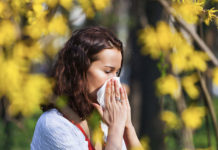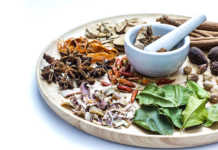
As the days get longer and the birds start chirping, allergy sufferers brace themselves. However, there are simple natural remedies that can be very effective for allergy relief. Bear in mind that different people seem to benefit from different remedies, so try more than one natural solution to see which works best for you.
Natural treatments are used to support and improve adrenal function, the immune system and digestion. For seasonal allergy sufferers, beginning natural therapies one to two months before the season starts can help reduce the severity of symptoms.
Nutrition Matters
Good health can help ease allergy symptoms, and good health starts with nutrition. Diet plays an important role in our overall health, and allergies are no exception. A recent study from Greece found that following the Mediterranean diet, rich in fruits and vegetables, had a protective effect for children with asthma and allergies. A German study, published in Allergy, found that participants who ate foods rich in omega-3 fatty acids were less likely to suffer allergy symptoms than those who didn’t regularly eat these foods. Omega-3s help fight inflammation and can be found in cold-water fish, walnuts and flaxseed oil, as well as grass-fed meat and eggs.
Spices can also be helpful additions to your diet. To help keep airways clear when pollen counts are high, add a dash of horseradish, chili peppers or hot mustard to your food for temporary congestion relief.
Increase your consumption of onions, which are high in quercetin, a bioflavonoid, which can help minimize the occurrence of watery or itchy eyes, asthma and hay fever.
Lifestyle Remedies
Small lifestyle changes can go a long way toward keeping allergy symptoms under control. Here are five easy changes you can make to reduce your seasonal allergy attacks:
Avoid using window fans because they can pull pollen indoors.
Drive with windows closed to avoid allergens.
Limit outdoor time when ragweed pollen counts are highest.
Use a Neti Pot for cleansing the sinuses. A little douse of saltwater can rinse away those prickly pollen grains and help treat allergies and other forms of sinus congestion.
Consider buying a HEPA air filter, which removes particles in the air by forcing them through screens containing microscopic pores.
Supplements That Can Help
Supplements are a natural alternative to medicine and can help reduce the impact allergies have on your life. Here are six to try:
Quercetin
Quercetin helps stabilize mast cells and prevents them from releasing histamine. It is also a natural antioxidant. Quercetin is found naturally in onions, apples, parsley, tea, tomatoes, broccoli, lettuce and wine.
Dose: 500 to 1,000 mg two or three times per day.
Stinging Nettle
Stinging nettle (Urtica dioica) is known to act as a natural antihistamine. It inhibits the body’s ability to produce histamine.
Dose: 1 to 2 capsules every 2 to 4 hours as needed.
Butterbur
Butterbur (Petasites hybridus) is derived from a common weed in Europe. It is another alternative to antihistamines. A Swiss study, published in the British Journal of Medicine, found that butterbur was as effective as the drug cetirizine, the active ingredient in Reactine, without the common sedative side effects. A word of caution however, butterbur is in the same family as ragweed, so it could worsen allergy symptoms in some cases.
Dose: 1 tablet of butterbur extract (containing 8 mg of petasin) four times a day.
Probiotics
Probiotics can influence the immune system and potentially correct the root cause of allergic reactions. They build up the body’s levels of a substance called secretory IgA, an immune system antibody in your lungs and gut whose primary job is to coat bacteria or other potentially bad proteins or substances like bacteria, viruses, food or environmental allergens to prevent them from adhering to the epithelial cells that line the gut and airways.
Dose: 10 to 15 billion CFUs per capsule daily.
Vitamin C with bioflavonoids
Vitamin C prevents the formation of histamine in the body. Allergens can cause certain cells in the body to produce histamine, which are responsible for common seasonal complaints like tearing, excess mucus and a runny nose. Bioflavinoids enhance the activity of vitamin C in the body and help stabilize mast cells, which secrete the histamine linked to allergic reactions.
Dose: Depending on bowel tolerance, one can easily take 1,000 to 3,000 mg per day.
EPA/DHA Fish Oils
Eicosapentaenoic acid (EPA) and docosahexaenoic acid (DHA), the components of omega-3, are natural anti-inflammatories. A recent German study found that a high content of omega-3 fatty acids in red blood cells or in the diet was associated with a decreased risk of hay fever.
Dose: 2,000 to 6,000 mg EPA/DHA daily with meals.
Clean Green
Using the wrong cleaning products can make your allergy symptoms worse. Avoid anything with strong noxious odours, such as ammonia, and products that produce particulates, including air fresheners and ozone generators.
Aerosol spray cleaners can also trigger allergy symptoms, and one study found that weekly use of cleaning sprays was linked to increases in rates of asthma, asthma-medication use and wheezing. More frequent use of these cleaners was associated with greater risk of worsening symptoms.
A great option for allergy prevention is to use eco-friendly cleaning products (see page TK) and to vacuum with cyclonic vacuums or vacuums with HEPA filters. Also, try using a mop that will pick up and retain dust rather than stirring it into the air. Wash bedding (including mattress pads) and kids’ stuffed animals regularly in hot water to keep allergen accumulation low.
What is an Allergy?
An allergy is an overaggressive immune response that is triggered by eating certain foods, touching certain substances, or inhaling an irritant like pollen, dust or animal dander. Allergies to pollen, spores, mold and dust (also called hay fever or allergic rhinitis) affect the respiratory system and are usually the most difficult to control.
Try These:
Salus Nettle Juice
Nettle Juice is a nutritive tonic and helps to relieve seasonal allergy symptoms. It contains quercetin, a powerful antioxidant that helps to stabilize mast cells and prevents them from releasing histamine. It’s also a diuretic. (200mL, $16.79)
Purica Grape Seed
This powerful antioxidant helps eliminate free radicals and supports healthy collagen. It can be helpful in reducing allergy symptoms, particularly when taken in conjunction with vitamin C. (120 capsules, $19.95)
New Roots Quercetin
A natural anti-inflammatory and antihistamine, quercetin helps relieve seasonal allergies and asthma. (90 capsules, $43)
Sisu Ester-C Supreme
Best known for supporting a healthy immune system and improving white blood cell function, vitamin C also helps reduce histamine release in the body, thereby naturally alleviating allergy symptoms. Ester-C is enhanced with quercetin and bioflavonoids for additional allergy relief.
(120 capsules, $37.99)
Webber Probitoic 30 Billion
Contains eight strains of friendly bacteria to support healthy intestinal flora and boost immune function.
(30 capsules, $17.99)
Now Omega-3
This highly researched 18:12 ratio of EPA/DHA is a great way to maintain and support cardiovascular health while naturally providing allergy relief. It’s a sustainable mixed fish source that has been tested for impurities and toxins.
(200 capsules, $15.99)
By: Dr. Joyce Johnson








